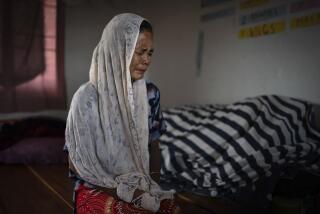Optimistic Signs Seen as Punjab Rebels Fade
LUDHIANA, India â Co-eds wear jeans and skirts again, pluck their eyebrows and use lipstick. High school students sing the national anthem in assemblies, and liquor shops are open.
Such things are the essence of normality in most places, but in Punjab state, they violate a code of conduct imposed by Sikh guerrillas a year ago and are punishable by death.
Optimists take the militantsâ lack of response as evidence that they are losing their grip after 13 years of fighting for an independent nation in Punjab, the only Indian state where Sikhs are a majority.
Police have killed more than a dozen guerrilla leaders in the last six months, and the state government claims to have broken the back of the insurrection, which has cost 15,000 lives.
âWe have got a majority of militants in our net, and now we are laying our hands on their supporters,â Kanwar Pal Singh Gill, chief of the Punjab police, said in Chandigarh, the state capital.
There is still little joy in Punjab, however, and no one claims that the war is over.
Critics say police gains have come at the expense of human rights. Patricia Gossman of the U.S. organization Asia Watch, who visited Punjab in October, said reports of police abuses and deaths of suspects in custody have risen sharply this year.
Pessimists point out that, in the past, the militants have struck back when their power has declined. What looks like a breakthrough, they say, is merely a lull before the next storm.
That may have been the motive when Sikh gunmen murdered 25 Hindu laborers Oct. 31 in two villages 12 miles southwest of Ludhiana, the first massacre in more than four months.
Afterward, the state-owned bus company suspended night service, which had resumed only weeks before after a nine-year hiatus. The routes pass through areas where guerrillas used to hijack buses and kill all the Hindus aboard.
The massacre did not halt Punjabâs apparent march toward normality, however. In the towns, stores are open after dark, property prices are climbing and companies are considering new factories in Punjab.
According to police reports, Sikh guerrillas killed 87 civilians in September, about half the average monthly total of the beginning of 1992.
Dozens of people were killed early in the year for violating the code of conduct, including teachers, journalists and liquor store owners, but there have been no victims since May.
Gurdip Singh, a lecturer at Arya College in Ludhiana, said: âThis always happens in a war. We shouldnât celebrate over the police victory. Itâs premature to say Punjab is returning to golden-era days.â
Many who violate the militant code are more optimistic.
âHow can someone else decide what I have to wear?â Komal Verma, a home economics student, said defiantly. âI wasnât born in a democratic country to be bullied like this. At 18, I can vote, but why canât I wear what I like?â
More to Read
Sign up for Essential California
The most important California stories and recommendations in your inbox every morning.
You may occasionally receive promotional content from the Los Angeles Times.










